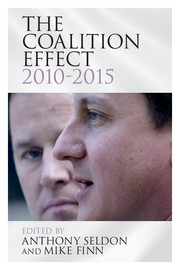Book contents
- Frontmatter
- Contents
- Contributors
- Acknowledgements
- David Cameron as Prime Minister, 2010–2015: The verdict of history
- Part I The coalition and the government of Britain
- Part II The coalition and policy
- Part III The coalition and political culture
- Part IV Conclusion
- 22 Conclusion: The net coalition effect
- Index
22 - Conclusion: The net coalition effect
Published online by Cambridge University Press: 05 April 2015
- Frontmatter
- Contents
- Contributors
- Acknowledgements
- David Cameron as Prime Minister, 2010–2015: The verdict of history
- Part I The coalition and the government of Britain
- Part II The coalition and policy
- Part III The coalition and political culture
- Part IV Conclusion
- 22 Conclusion: The net coalition effect
- Index
Summary
Britain's first peacetime coalition government since the 1930s came into being due to perceived political necessity, but, as this volume has shown, this did not prevent it setting high ambitions for itself nor did it impinge on its ability to generate ‘effects’ – in legislative terms, economic terms, in terms of the machinery of government, or in terms of its impact on political culture and society as a whole. If Cameron will go down in history as a significant premier, so too will the administration he led.
The ambitions, however, might be the ‘catch’ in terms of any verdict on the coalition's place in history. Both in terms of vision and operational considerations the coalition on formation enunciated grandiose ideas of what it might achieve. In terms of vision, the coalition's two leaders espoused the virtues of ‘a new politics’ in the Coalition Agreement's Programme for Government they were clear that the unexpected union of the two parties might yield possibilities and opportunities greater than those available to a single party governing alone. This was, on the face of it, a bold claim – the equivalent of claiming that the coalition was, in Panglossian vein, the best of all possible worlds, better even than a government simply Conservative or simply Liberal Democrat in character. It also had a ring of truth; both Cameron and Clegg were undoubtedly happier working with each other than with the right and left of their parties respectively. Part of the measure of the coalition's effect must be to assess whether the voters were convinced that this ‘new politics’ was meaningful and, in fact, desirable.
Beyond the nebulous, the specifics–which animated the original coalition documentation – were clear: eradicating the structural deficit within the life of the parliament, establishing firm control of public finances and restoring the economy to growth. They were fundamentally economic in focus; not unreasonably so given the undeniable crisis in the economy and the public finances which the coalition inherited from their predecessors.
- Type
- Chapter
- Information
- The Coalition Effect, 2010–2015 , pp. 601 - 607Publisher: Cambridge University PressPrint publication year: 2015



